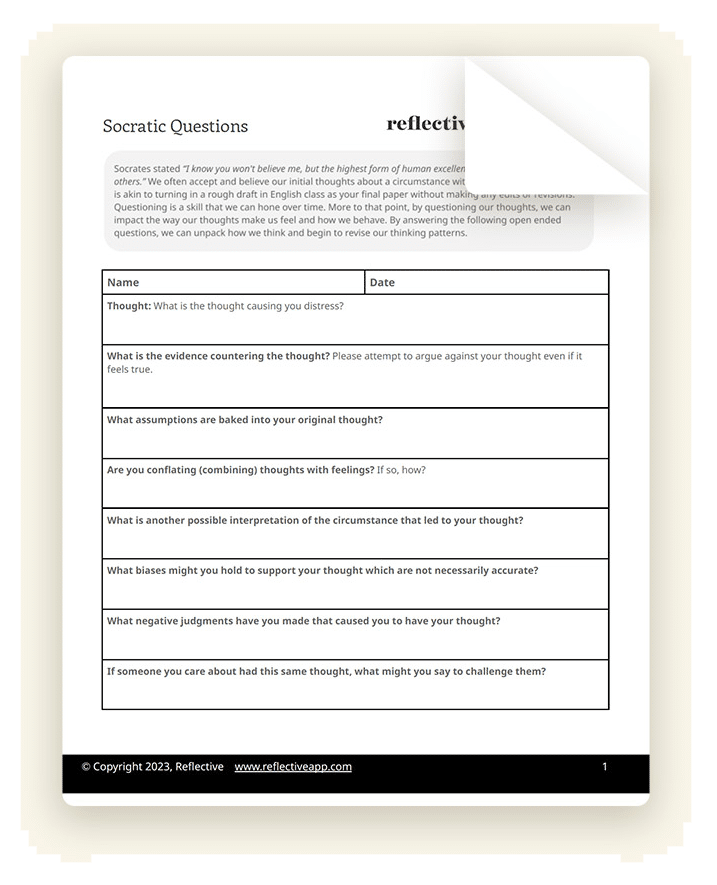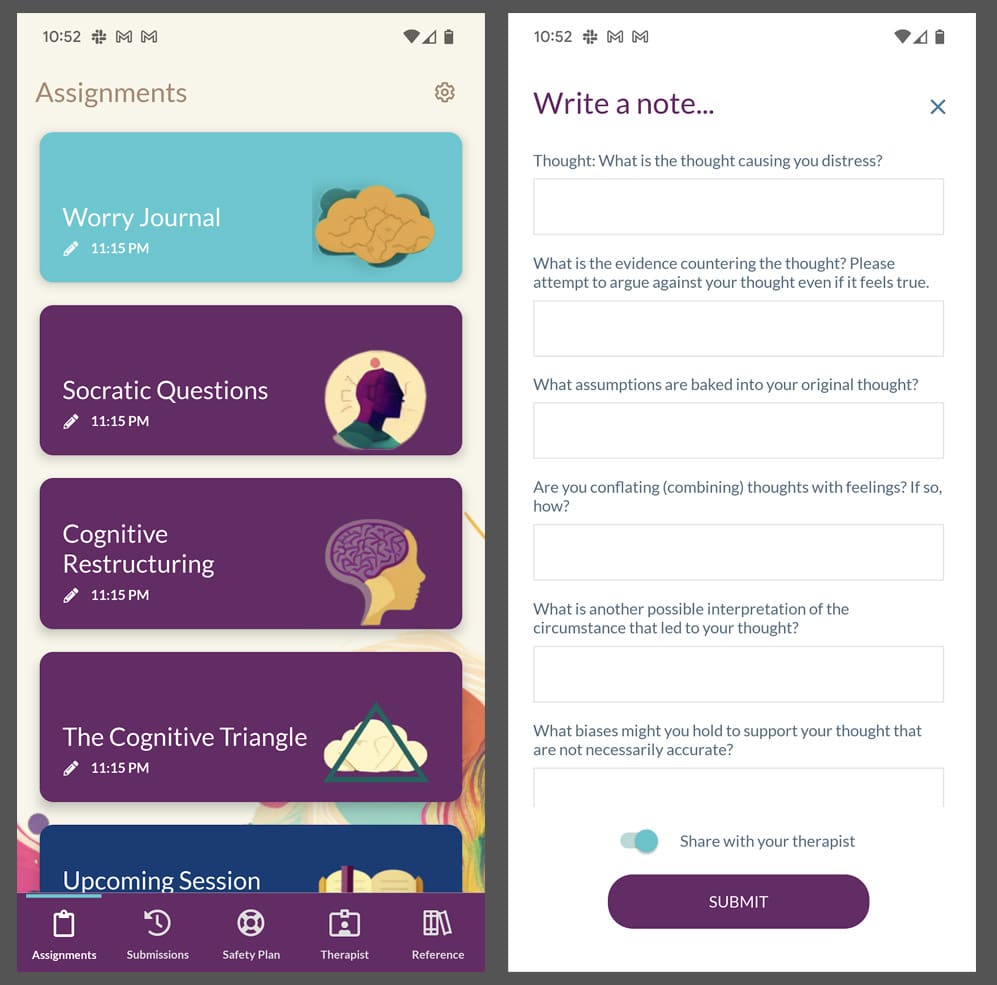Socratic Questioning in Cognitive Psychology
In cognitive psychology, asking questions is not just about seeking answers. It’s about getting a client to build self-awareness, challenge their own beliefs, and promote personal growth. One technique used in this context is Socratic questioning, a method named for Socrates, the ancient Greek philosopher, which aids patients in cognitive restructuring.

Table of Contents
- What is Socratic Questioning?
- Socrates: The Father of Critical Thinking
- The Intersection with Cognitive Therapy
- When is Socratic Questioning Used in Therapy?
- Treating Anxiety, Depression, and OCD
- How to Use Socratic Questioning in Therapy?
- Methods of Filling Out Socratic Questions
- Apps can aid the therapy process
- Reflective: The Therapist-Facilitated App
- Get the free worksheet
What is Socratic Questioning?
Socrates: The Father of Critical Thinking
Socrates, an ancient Greek philosopher, is often hailed as the father of critical thinking. His unique style of questioning was not about imparting knowledge but about stimulating critical thinking and illuminating ideas. This method was not just a pedagogical tool, but a way of life, encouraging individuals to understand the world through reflection and introspection.
The Intersection with Cognitive Therapy
In the context of cognitive therapy, especially Cognitive Behavioral Therapy (CBT), Socratic questioning serves as a bridge to uncovering underlying beliefs and assumptions. It aids in challenging cognitive distortions and helps individuals reconstruct their thought patterns in healthier ways, called cognitive structuring.
When is Socratic Questioning Used in Therapy?
Treating Anxiety, Depression, and OCD
When treating conditions like anxiety, depression, and obsessive-compulsive disorder (OCD), Socratic questioning plays a pivotal role in helping patients dissect and challenge their maladaptive beliefs and thought patterns.
In the context of anxiety, a patient might hold catastrophic beliefs about certain situations. This is called, “catastrophizing.” For instance, imagine Sarah, a young professional who constantly fears making mistakes at work. Through Socratic questioning, her therapist might ask, “What evidence supports the belief that a single mistake will ruin your career?” This question challenges Sarah to confront her irrational fears, paving the way for healthier thought patterns. These questions aim to challenge the validity of the anxious belief and encourage the patient to consider alternative, more rational perspectives.
For depression, a common symptom is pervasive negative thinking. A patient might believe they’re worthless or that they’ve never achieved anything of significance. Here, Socratic questioning can be employed to challenge these beliefs: “Can you think of times when you’ve been proud of your achievements?” or “How do your friends and family view your worth?” By prompting reflection, the patient can begin to see that their beliefs might be overly negative and not entirely based on reality.
In the case of OCD, patients often have intrusive thoughts that lead to ritualistic behaviors. For example, someone might believe that if they don’t check the stove multiple times, their house will burn down. Socratic questioning in this scenario might involve asking, “What evidence do you have that the stove is still on after you’ve checked it once?” or “Have there been times when you checked it once and nothing happened?” These questions aim to challenge the irrational beliefs driving the compulsive behaviors, helping the patient recognize the discrepancy between their thoughts and reality.
Identifying Faulty Thought Patterns
Take the case of Alex, who believes he’s unlovable after a breakup. A therapist might ask him, “Have there been instances where you felt loved and appreciated?” By prompting Alex to recall positive experiences, the therapist helps him challenge his current negative belief. By questioning those negative beliefs, Alex will have positive answers to challenge those negative thoughts in the future.
How to Use Socratic Questioning in Therapy?
In-session Practice
Using Socratic Questions as worksheets during session provides a structured way for patients to confront their beliefs. Practicing this in-session ensures that the therapist can guide the patient, correcting any misinterpretations and reinforcing positive behaviors. Developing the skills in-session will give the patient the ability to apply the technique to their daily life.
Homework Assignments
Assigning Socratic Questions worksheets as homework amplifies therapeutic engagement. It’s akin to practicing a musical instrument; the more you practice, the better you become. By filling out these worksheets between sessions, patients reinforce the skills learned in-session and develop the habit of positive thoughts.
The Benefits of Homework
For the patient, this homework fosters self-awareness and self-improvement. Practice makes perfect! When the patient becomes accustomed to challenging negative thoughts while confronted with situational triggers, they will develop a healthier habit, putting those negative patterns in check. For the therapist, reviewing these sheets provides clinical insights into the patient’s progress and areas of concern.
Methods of Filling Out Socratic Questions
Completing therapy homework by hand offers cognitive benefits, as the act of writing enhances memory retention and comprehension. Writing engages multiple cognitive processes, leading to deeper information processing. The tactile experience of writing can also be grounding, offering a moment of mindfulness. However, there are drawbacks. Individuals with physical disabilities, such as arthritis, or learning disabilities like dyslexia, may find handwritten tasks challenging or painful. As many have shifted away from regular handwriting in favor of digital devices, some may find their handwriting skills rusty, making the process tedious. Physical worksheets can also be easily misplaced, leading to non-compliance with therapy assignments.
Apps can aid the therapy process

Self-guided therapeutic apps offer ease and convenience. With these digital tools, individuals have the ability to access therapeutic resources and exercises right at their fingertips. This on-demand accessibility can be a game-changer for many, especially in moments of distress or when immediate coping strategies are required.
However, while these apps bring therapy into the digital age, they are not without their short-falls. One significant concern is the absence of therapist oversight. Without a professional guiding the therapeutic process, there’s a risk that users might misinterpret or misuse the tools, potentially leading to unintended consequences. Additionally, the very nature of these apps is to increase “user engagement” sucking patients down paths that are not necessarily indicated for their treatment; an unnecessary distraction.
Reflective: The Therapist-Facilitated App
Reflective stands out in the digital landscape. This therapist-facilitated app offers personalized reminders and assignments, ensuring that patients receive what they need. With the therapist’s oversight and the convenience of a digital platform, it strikes the perfect balance.
With Reflective, a therapist can add the precise assignments a patient needs, and it can be customized and set on the schedule that works best for them. Additionally, the build-in accountability and structured connection with their therapist increases treatment compliance and clinical insight. Patients have the convenience and ease of an app in their pocket, with the comforting knowledge their therapist is on the other side of their assignment submissions.


